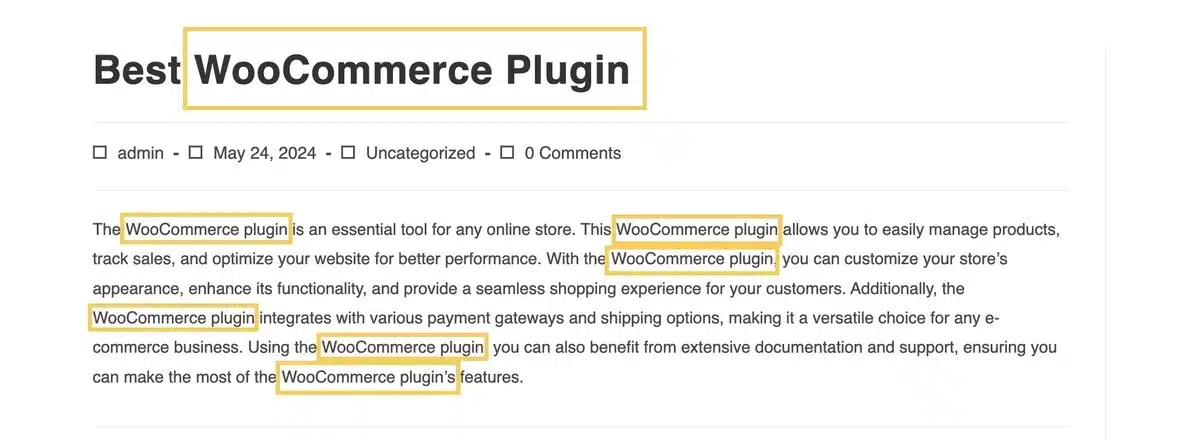How Many Keywords Should I Use For SEO

How many keywords should I use for SEO? is one of the most common queries when it comes to search engine optimization for websites.
Finding the ideal mix is essential; too few keywords could make you less visible, while too many could cause keyword stuffing, which would lower your ranks.
This blog post will discuss how many keywords are too much, as well as the significance of keyword density and relevancy. Additionally, we’ll offer helpful advice on how to successfully include them in your material.
Regardless of your level of experience with SEO, knowing how to employ keywords wisely will improve your site’s performance and increase organic traffic.
Importance of Keywords in SEO

When attempting to determine how many keywords to use for SEO, it is essential to comprehend the significance of keywords.
Essential to SEO (Search Engine Optimization) are keywords since they connect the dots between the material you offer and what people are looking for.
The power of keywords to clarify the subject and applicability of your content to search engines is what makes them so important.
You may increase the probability that your website will show up in search engine results when people type in relevant keywords into its headings, meta tags, and content.
This raises your profile, brings in targeted traffic, and eventually raises the likelihood that site visitors will become paying clients.
Additionally, carefully considered keyword research can provide insights into user behavior and trends, helping you to better tailor your content strategy to the needs and preferences of your audience.
Understanding Keyword Stuffing

It’s crucial to comprehend keyword stuffing in relation to the optimal number of keywords for search engine optimization.
In order to affect a site’s ranking in search engine results, website creators engage in this practice, loading pages with irrelevant terms.
When search engines first launched, and their algorithms were more basic, this method was more popular.
But because to advancements in technology, search engines are now able to identify pages that include an excessive number of keywords.
Stuffing information with too many keywords can make it difficult to read and comprehend, which is bad for the user experience.
Additionally, it may lead to search engine penalties, which may result in a website being dropped entirely or given a worse ranking in search results.
It is preferable to concentrate on producing high-quality, pertinent content that organically integrates keywords in a way that benefits readers rather than keyword stuffing.
This strategy raises search engine ranks while also making the user experience better overall.
Factors Determining Keyword Density

It’s important to understand that keyword density, which was formerly a significant component in search engine optimization (SEO), has changed when deciding how many keywords to utilize.
Though properly using keywords is still crucial, SEO strategies are now shaped by a number of characteristics that go beyond keyword density.
- Relevance: To improve user experience and prevent penalties, keywords must match the content.
- Natural Language: User value and content readability are more important than keyword stuffing.
- Keyword Prominence: Headings, titles, and opening paragraphs are good places to put keywords.
- Keyword Proximity: Keywords that are positioned closely together may be relevant.
- Keyword Frequency: Using keywords sparingly indicates relevancy, even when density is less important.
- Variety of Keywords: Using synonyms and related terms improves the comprehensiveness of the text.
- User Experience: SEO is improved by giving priority to elements like mobile friendliness and page speed.
- Competition: The level of competition between keywords affects SEO tactics.
- Algorithm Shifts: Search engine optimization tactics need to change with the times.
- Contextual Relevance: Priority is given to content that is in line with website themes and user intent.
Instead than focusing only on keyword density, modern SEO places an emphasis on creating high-quality content that satisfies user needs.
How Many Keywords Should I Use For SEO
How many keywords should I use for SEO? is the question. For SEO, it is best to have one main keyword on every page on your website. Additionally, you ought to provide a few supporting keywords.
For instance, you may use supporting keywords like “WooCommerce WordPress Plugin” or “Plugins for Ecommerce Store” in your blog post if your main keyword is “Best WooCommerce Plugin.”
You might be able to rank for a number of keywords with related search intent by doing this.
How to Use SEO Keywords
Making appropriate use of SEO (Search Engine Optimization) keywords is crucial to raising the visibility of your website in search engine results.
Once you grasp the question, “How many keywords should I use for SEO?” below is a step-by-step method to assist you in using SEO keywords:
1. Research Keywords
- Determine Your Audience: Recognize who your target market is and what questions they are asking.
- Use Tools: To locate appropriate keywords, use keyword research tools such as Ubersuggest, Ahrefs, SEMrush, and Google Keyword Planner.
- Analyze Rivals: Find out which keywords your rivals are ranking for.
2. Pick the Appropriate Keywords
- Relevance: Select keywords that make sense for your audience and content.
- Search Volume: Choose terms that are reasonably competitive but have a sizable search volume.
- Long-Tail Keywords: Use longer, more focused phrases known as “long-tail” keywords to increase targeted traffic and decrease competition.
3. Make Your Content More Effective
- Title Tags: Ideally, your main term should be first in the title tag.
- Meta Descriptions: Include your keyword in a well-written meta description.
- Headings: H1, H2, H3, and so on. To organize your information, include keywords in your headings.
- Body text: Use keywords sparingly and organically to enhance the text.
- URL: Verify that the URL contains the main term and is clear.
- Image Alt Text: Include keywords in the alt text of your photographs to aid search engines in comprehending the content.
4. Maintain Keyword Density
- Natural Flow: Make sure the language flows smoothly with the keywords. There may be consequences for overstuffing.
- Keyword Density: Try to keep your keyword density between 1% and 2% of the total word count, but pay more attention to the user’s experience and readability.
5. Make Use of LSI Keywords
- Latent Semantic Indexing (LSI) Keywords: Give your main keywords some context by including synonyms and related terms.
6. Produce High-Quality Content
- Value: Make sure the reader receives value from your material in the form of information and engagement.
- Length: Articles with 1000 words or more usually rank higher, but content quality is more crucial than quantity.
7. Make Mobile Friendly
- Responsive Design: Make sure your website is mobile-friendly with responsive design, as search engines prefer mobile-friendly websites.
- Load Time: For a better user experience, speed up page loads.
8. Make Use of Both Internal and External Links
- Internal Links: To maintain user interest and spread page authority, include links to other pages on your website.
- External Links: To establish credibility, include links to reliable outside websites.
9. Keep an Eye on and Make Adjustments
- Analytics: To monitor keyword performance, use tools such as Google Analytics and Google Search Console.
- Modify Your Strategy: Based on performance statistics, regularly examine your keywords and strategy and make any necessary modifications.
10. Keep Up to Date
- Algorithm Changes: Stay abreast of the most recent modifications to search engine algorithms to guarantee the continued efficacy of your SEO tactics.
Once I’ve determined how many keywords I should use for SEO. You can then employ SEO keywords to raise your website’s search engine rating and draw in more organic traffic by following these procedures.
In Summary
As we get to the end of our conversation about the ideal number of keywords for SEO, it is evident that determining the sweet spot calls for a methodical approach.
Relevance, diversity, and user intent must come first rather than concentrating on a certain amount.
Over time, you can improve your strategy by incorporating a variety of highly relevant keywords, including long-tail versions, and regularly reviewing performance indicators.
Always prioritize user-specific, high-quality content before keyword density.
By keeping an eye on changing search trends and user behavior, you can refine your keyword approach to improve your website’s exposure and draw in the proper kind of visitors.
FAQs
What is the best way to select keywords for my website?
Recognize your target market’s search intent before anything else. Find appropriate terms with respectable search volumes and reasonable competition by conducting keyword research with tools such as Google Keyword Planner, SEMrush, or Ahrefs. Additionally, take into account less competitive and more detailed long-tail keywords.
Which keywords should I use, general or specific?
Achieving a mix of general and targeted keywords is recommended. Although broad keywords are more competitive, they may have bigger search volumes. Long-tail, focused keywords may draw more targeted traffic despite having a lower search volume. Blend the two, depending on your goals and content approach.
How frequently should my keywords be updated?
Review and alter your keyword strategy on a regular basis to accommodate evolving industry trends, fluctuations in search trends, and changes in the preferences of your target audience. To make sure your keywords are still relevant and successful at bringing in organic traffic to your website, try to update them every few months.
Is it possible to utilize the same keywords on every page of my website?
It’s tempting to utilize the same set of keywords on every page to maintain consistency, but this is not advised. It is probable that every page on your website has a distinct function and caters to a distinct audience group. For best SEO results, adjust your keyword usage to match the unique content and purpose of each page.
What part in SEO do keyword variations play?
Synonyms, plurals, and different spellings of your keywords can help your content appear more widely and be more relevant to a wider range of search queries. Including naturally occurring variations in your content increases the likelihood that it will rank for related terms and indicates relevance to search engines.

Kartika Musle
A Tech enthusiast and skilled wordsmith. Explore the digital world with insightful content and unlock the latest in tech through my vision.

Leave a Reply